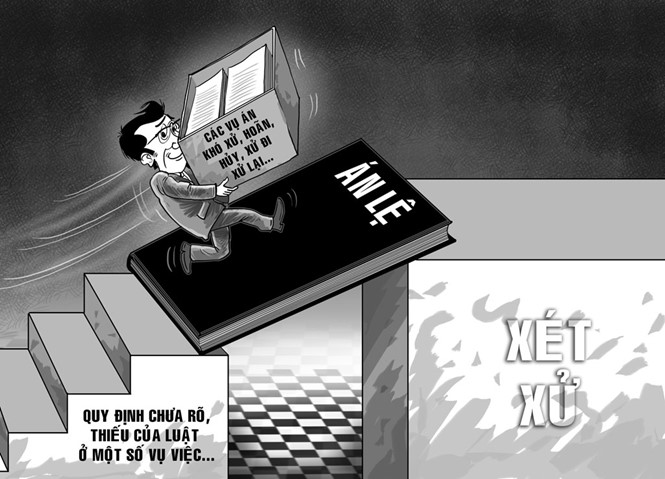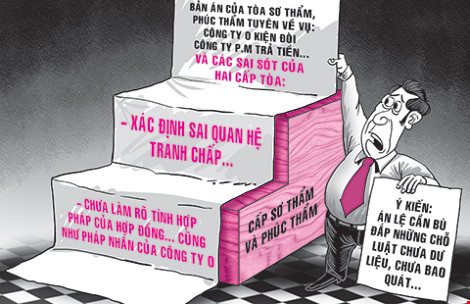Hanoi-Vietnam: Principles for applying precedents in adjudication
Precedent is recognized and used in adjudication in many countries around the world. Vietnam also allows the application of precedents. The Supreme People's Court of Vietnam has published the first 06 precedents, and from June 01, 2016, the precedents are officially applied in adjudication nationwide.

The recognition and application of precedent in adjudication is an initial achievement of judicial reform. The application of precedent is an effective method to address the shortcomings of the law, ensure uniform application of the law in adjudication, and create stability, transparency, and foreseeability in the Court's judgments. This has the effect of guiding behavior not only for the parties in the case but also for the entire society. The Council of Judges of the Supreme People's Court of Vietnam of Vietnam promulgated Resolution 03/2015/NQ-HDTP on selecting, announcing, and applying precedent.
Criteria for selecting precedent
Precedent is understood to be the arguments and decisions in a legally valid judgment or court decision on a specific case selected by the Council of Judges of the Supreme People's Court of Vietnam and announced by the Chief Justice of the Supreme People's Court of Vietnam as precedent for Courts to study and apply in adjudication. The selected precedent should meet the following criteria:
- Contain arguments to clarify legal provisions that have different interpretations; analyze and explain legal issues and events, indicating the principles, guidelines for handling, and legal norms to be applied in a specific case;
- Meet conventional standards;
- Provide guidance for the uniform application of the law in adjudication, ensuring that cases with similar legal facts and events are resolved similarly.
Principles for applying precedent in adjudication
The application of precedent in adjudication must comply with the following principles:
- When adjudicating, Judges and Jurors must study and apply precedent to resolve similar cases, ensuring that cases with identical legal facts and events are resolved similarly.
In cases where precedent is applied, the judgment or court decision containing the precedent, the nature and circumstances of the similar case mentioned in the precedent, and the nature and circumstances of the ongoing case must be cited, analyzed, and clarified in the court's judgment or decision; if precedent is not applied, the judgment or decision must analyze, argue, and clearly state the reasons.
- Judges and Jurors shall not apply precedent in cases where:
+ There is a change in Laws, Resolutions of the National Assembly, Ordinances, Resolutions of the Standing Committee of the National Assembly, and Decrees of the Government of Vietnam, rendering the precedent inappropriate;
+ There is a change in circumstances leading to the inappropriate precedent.

Contents of the first 06 precedents applicable in adjudication from June 1, 2016.
- Precedent No. 01/2016/AL: In a case involving accomplices, if it is proven that the mastermind's subjective intent was only to hire others to inflict injury on the victim without the intention of depriving them of life (the mastermind only requested injuries to the victim's limbs and not to vital parts of the body that could lead to death); and the executor performed as per the mastermind's request; if the victim's death was beyond the mastermind's subjective intent, then the mastermind must bear criminal responsibility for the crime of "Intentional Infliction of Injury" with the aggravating circumstance being "causing injury leading to death."
- Precedent No. 02/2016/AL: When a Vietnamese residing abroad provides funds to purchase land use rights and asks someone in the country to hold the land title on their behalf, in case of disputes, the Court must consider and calculate the efforts for maintenance, preservation, and enhancement of the land use value by the titleholder; if the exact efforts of the titleholder cannot be determined, it should be assumed that the person who actually paid for the land use rights and the titleholder have equal efforts to share the added value compared to the initial purchase amount.
- Precedent No. 03/2016/AL: When parents have given a plot of land to their child's married couple, and they have built a house on it without any objections from the parents or other family members, and the couple has used the land and house continuously, publicly, and stably and has registered the land and obtained a land use certificate, it should be recognized that the married couple has been gifted the land use rights.
- Precedent No. 04/2016/AL: When the land and house are shared property of a married couple, but only one person signs a transfer contract, and if there is sufficient evidence that the transferor has received full payment according to the agreement and the non-signing person knew of and used the transfer money, and the transferee has openly managed and used the land and house, and the non-signing person had no objections, it must be determined that they agreed with the transfer.
- Precedent No. 05/2016/AL: In an inheritance dispute where there's a party eligible to receive a portion of the inheritance and has contributed to the management, preservation, and enhancement of the inheritance asset but objects to the inheritance distribution (claiming the statute of limitations for inheritance claims has expired), and does not explicitly request an evaluation of their contributions, if the Court decides on inheritance distribution, it must consider their contributions because the objection to inheritance distribution takes precedence over the request to evaluate contributions.
- Precedent No. 06/2016/AL: In an inheritance dispute involving heirs residing abroad, if the Court has executed judicial delegation and evidence collection per legal provisions but fails to determine the address of those heirs, the Court still addresses the plaintiff's claims; if the inheritance asset, inheritance class, and the deceased's lack of a will are determined, the Court shall distribute the inheritance to the plaintiff according to law; the portion of absent heirs whose addresses cannot be determined will be temporarily entrusted to local heirs to manage and later hand over to the absent heirs.
- 18 judgments, decisions proposed to be developed into case law
- Hanoi-Vietnam: Precedent No. 07/2016/AL
- Hanoi-Vietnam: Precedent No. 08/2016/AL
- Hanoi-Vietnam: Precedent No. 09/2016/AL
- Hanoi-Vietnam: Clarification on reference and application of precedents in adjudication
- Resolution 03/2015 guiding the application of case law in trial practices
-

- Number of deputy directors of departments in Vietnam ...
- 15:04, 05/03/2025
-

- Cases ineligible for pardon in Vietnam in 2025
- 14:43, 05/03/2025
-

- Decree 50/2025 amending Decree 151/2017 on the ...
- 12:00, 05/03/2025
-

- Circular 07/2025 amending Circular 02/2022 on ...
- 11:30, 05/03/2025
-

- Adjustment to the organizational structure of ...
- 10:34, 05/03/2025
-

- Notable new policies of Vietnam effective as of ...
- 16:26, 11/04/2025
-
.Medium.png)
- Notable documents of Vietnam in the previous week ...
- 16:21, 11/04/2025
-
.Medium.png)
- Notable documents of Vietnam in the previous week ...
- 16:11, 02/04/2025
-
.Medium.png)
- Notable new policies of Vietnam to be effective ...
- 16:04, 02/04/2025
-
.Medium.png)
- Notable new policies of Vietnam effective from ...
- 14:51, 21/03/2025
 Article table of contents
Article table of contents
